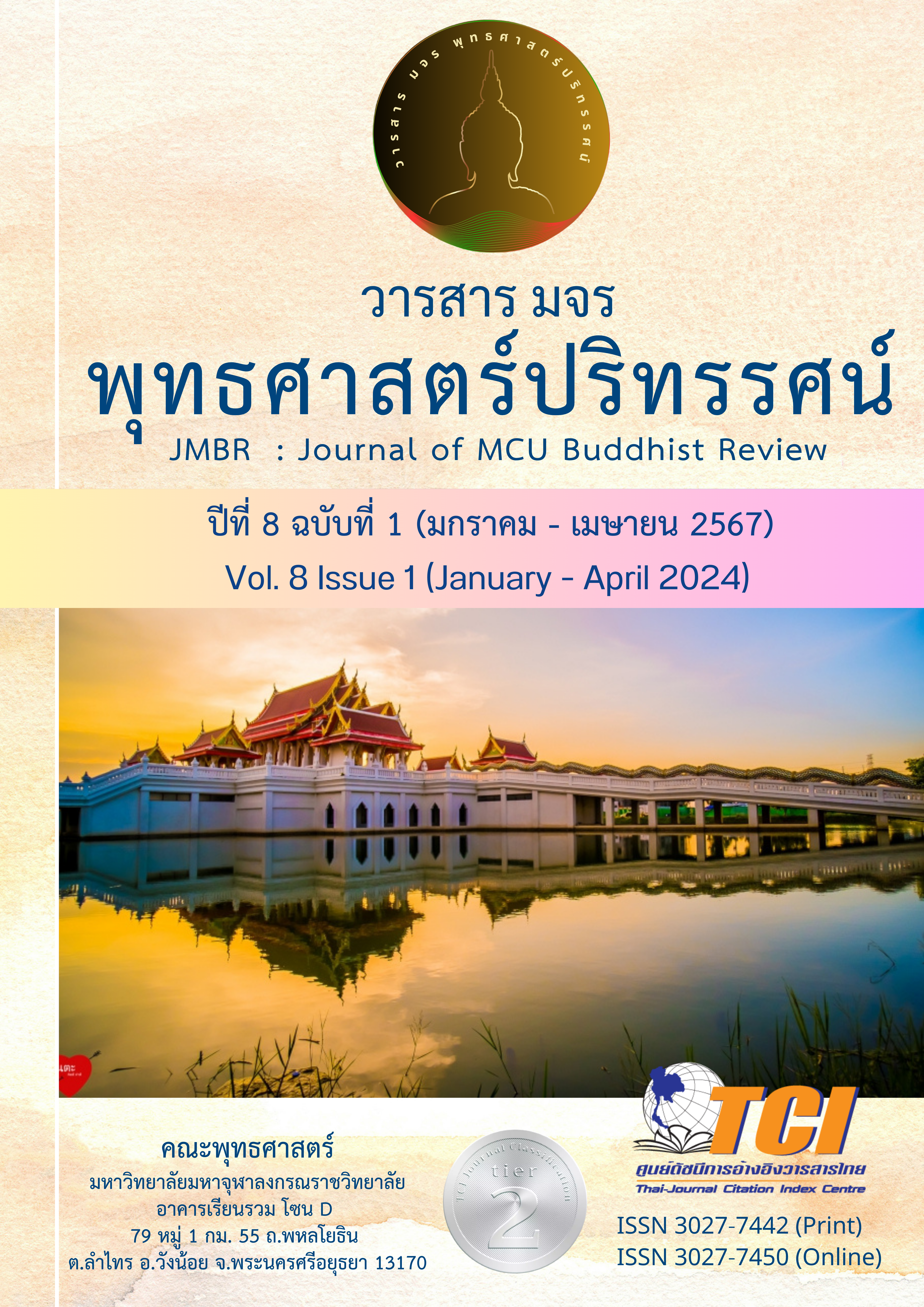พลวัตการขับเคลื่อนหน่วยอบรมประชาชนประจำตำบลอำเภอนาน้อย จังหวัดน่าน
Main Article Content
บทคัดย่อ
บทความวิจัยนี้มีวัตถุประสงค์ 1) เพื่อศึกษาสภาพและปัญหาของการดำเนินการของหน่วยอบรมประชาชนประจำตำบลอำเภอนาน้อยจังหวัดน่าน 2) เพื่อศึกษาพลวัตการขับเคลื่อนหน่วยอบรมประชาชนประจำตำบลอำเภอนาน้อยจังหวัดน่าน วิจัยเชิงคุณภาพ เก็บข้อมูลจากเอกสารและข้อมูลภาคสนามจากการสัมภาษณ แล้วนำมาสรุปผลการวิจัย ผลการศึกษาพบว่า 1) สภาพและปัญหาของการดำเนินการของหน่วยอบรมประชาชนประจำตำบลอำเภอนาน้อยจังหวัดน่าน 8 ด้าน คือ (1) ด้านความสามัคคี ชุมชนขาดความร่วมมือกัน (2) ด้านสุขภาพอนามัย ไม่มีเงินในการรักษาเพื่อดูแลสุขภาพอนามัย (3) ด้านวัฒนธรรมศีลธรรม ประชาชนขาดความรู้ความเข้าใจด้านศีลธรรม (4) ด้านส่งเสริมอาชีพ ไม่มีการส่งเสริมจากภาครัฐอย่างจริงจัง (5) ด้านสันติสุข ส่วนใหญ่ชุมชนปรองดองกัน (6) ด้านการศึกษาสงเคราะห์ การช่วยเหลือในด้านการศึกษายังมีน้อย (7) ด้านสาธารณสงเคราะห์ ขาดการการสนับสนุนช่วยเหลือกันเท่าที่ควร (8) ด้านกตัญญูกตเวทิตาธรรม พ่อแม่ขาดการเคารพจากลูกหลาน เพราะไม่มีเวลาอบรมสั่งสอน 2) พลวัตการขับเคลื่อนหน่วยอบรมประชาชนประจำตำบลอำเภอนาน้อยจังหวัดน่าน 8 ด้าน คือ (1) ด้านความสามัคคี มีการจัดกิจกรรมอบรมประชาชนในเรื่องความสามัคคีตามหลักสาราณียธรรม (2) ด้านสุขภาพอนามัย มีการรณรงค์งดเหล้าเข้าพรรษา งดเหล้าในงานศพและงานบุญ เพื่อให้ประชาชนดูแลใส่ใจสุขภาพ (3) ด้านวัฒนธรรมศีลธรรม มีการจัดกิจกรรมปฏิบัติธรรมอบรมจิตตภาวนาอบรมให้ความรู้ด้านคุณธรรมและจริยธรรมแก่ประชาชน (4) ด้านส่งเสริมอาชีพ มีการจัดประชุมหมู่บ้าน โดยจัดให้วัดเป็นศูนย์เรียนรู้ด้านอาชีพ (5) ด้านสันติสุข มีการวางแผนร่วมกันระหว่างวัด บ้าน และหน่วยงานราชการ เพื่อขับเคลื่อนโครงการหมู่บ้านศีล 5 อันเป็นโครงการที่จะนามาซึ่งความสันติสุขของชุมชน (6) ด้านศึกษาสงเคราะห์ มีการวางแผนช่วยเหลือด้านการศึกษาแก่เยาวชนและสนับสนุนให้วัดที่มีความพร้อมมีส่วนร่วมในการจัดการศึกษา (7) ด้านสาธารณสงเคราะห์ มีการวางแผนการทำงานแบบมีส่วนร่วมระหว่างวัด บ้าน และหน่วยงานราชการ โดยเตรียมความพร้อมในการป้องกันบรรเทาสาธารณภัย (8) ด้านกตัญญูกตเวทิตาธรรม มีการจัดกิจกรรมปลูกฝังคุณธรรมจริยธรรมเรื่องความกตัญญูกตเวที เช่น วันพ่อแห่งชาติ วันแม่แห่งชาติ
Article Details

อนุญาตภายใต้เงื่อนไข Creative Commons Attribution-NonCommercial-NoDerivatives 4.0 International License.
- บทความที่ได้รับการตีพิมพ์เป็นลิขสิทธิ์ของวารสาร มจร พุทธศาสตร์ปริทรรศน์
- ข้อความใดๆ ที่ปรากฎในบทความที่ได้รับการตีพิมพ์ในวารสาร ถือเป็นความรับผิดชอบของผู้เขียนบทความ และข้อคิดเห็นนั้นไม่ถือว่าเป็นทัศนะและความรับผิดชอบของกองบรรณาธิการวารสาร มจร พุทธศาสตร์ปริทรรศน์
เอกสารอ้างอิง
ณัฐชยา ส้มเขียวหวาน. (2541). บทบาทของพระสงฆ์ในการอนุรักษ์ทรัพยากรป่าไม้ในจังหวัดราชบุรี. วิทยานิพนธ์ศิลปศาสตรมหาบัณฑิต บัณฑิตวิทยาลัย: มหาวิทยาลัยรามคำแหง.
พระครูสมุห์ดิฐภูมิ จิรธมฺโม และคณะ. (2564). รูปแบบการบริหารจัดการหน่วยอบรมประชนประจำตำบลของคณะสงฆ์จังหวัดสุราษฎร์ธานี. รายงานการวิจัย. ศูนย์วิจัยพุทธศาสตร์: มหาวิทยาลัยมหาจุฬาลงกรณราชวิทยาลัย.
พระครูอาทรวชิรกิจ (มานะ ฐานิสฺสโร). (2562). การพัฒนาการจัดการหน่วยอบรมประชาชนประจำตำบลในจังหวัดกำแพงเพชร. ดุษฎีนิพนธ์พุทธศาสตรดุษฎีบัณฑิต บัณฑิตวิทยาลัย: มหาวิทยาลัยมหาจุฬาลงกรณราชวิทยาลัย.
พระจารุวัฒน์ ภูริวฑฺฒโน (คําชุม). (2555). การศึกษาผลการดําเนินงานของหน่วยอบรมประชาชนประจําตําบลในเขตการปกครองคณะสงฆ์ จังหวัดลําปาง. วิทยานิพนธ์พุทธศาสตรมหาบัณฑิต บัณฑิตวิทยาลัย: มหาวิทยาลัยมหาจุฬาลงกรณราชวิทยาลัย.
มหาจุฬาลงกรณราชวิทยาลัย. (2539). พระไตรปิฎกภาษาไทย ฉบับมหาจุฬาลงกรณราชวิทยาลัย. กรุงเทพฯ: มหาจุฬาลงกรณราชวิทยาลัย.
อัครเดช พรหมกัลป์ และคณะ. (2563). ปรัชญาเศรษฐกิจพอเพียงกับการขับเคลื่อนหน่วยอบรมประชาชนประจำตำบล (อ.ป.ต.) ในการพัฒนาสังคมเชิงพุทธบูรณาการภายใต้การขับเคลื่อนตามแนวประชารัฐ. วารสารสันติศึกษาปริทรรศน มจร. 8(6), 1439-1451.


